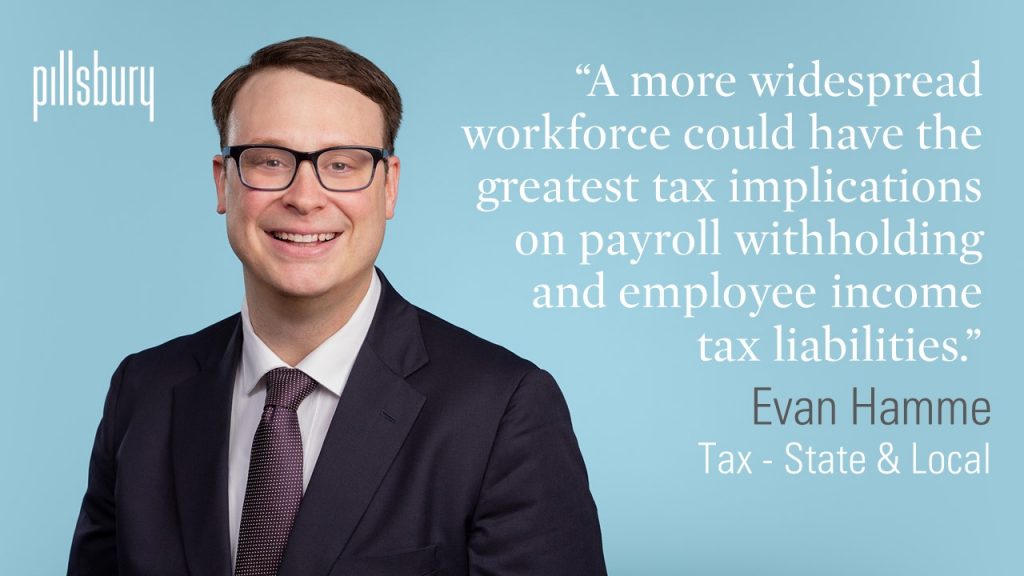Pillsbury Counsel Evan Hamme discussed how the rise in remote work could lead to tax compliance issues for employers with Law360. Read more here. Continue Reading ›
Continue Reading ›
2021 CalTax Foundation Webinar Series
Pillsbury SALT partner Carley Roberts will participate in the CalTax Webinar series on August 24. The theme for the webinar is “How to Navigate the Appellate Process at the OTA.”
COST’s 2021 State and Local Tax Workshop and Webinar for the Tech Industry
Pillsbury SALT partners Jeff Vesely, Annie Huang, Marc Simonetti and counsel Robert Merten III will present during COST’s 2021 SALT Workshop for the Tech Industry August 11 through 13. Continue Reading ›
Continue Reading ›
COST’s 2021 State Transaction Tax Webinar
Pillsbury SALT partner Jeffrey Vesely will present during COST’s State Transaction Tax Webinar on July 15. Continue Reading ›
Continue Reading ›
Massachusetts High Court Approves of Apportionment of Sales Tax on Software Through General Abatement Process
The Massachusetts Supreme Judicial Court recently held that software vendors have a statutory right to apportion tax on the sale of prewritten computer software purchased for use in multiple states and that they may do so through the Commonwealth’s general tax abatement process. The court’s decision in Oracle USA, Inc. v. Commissioner of Revenue, 487 Mass. 518 (2021) confirms that the ability to apportion tax on software is not contingent on strict compliance with the administrative procedures set forth in the Massachusetts Commissioner of Revenue’s apportionment regulation. The tax abatement process is an acceptable mechanism for taxpayers to seek tax apportionment with respect to software purchased for use in multiple jurisdictions. Continue Reading ›
Continue Reading ›
California Lawyers Association’s 2021 Annual Income Tax Seminar

Pillsbury SALT attorneys Robert Merten and Lexi Louderback will present during CLA’s Annual Income Tax Seminar on July 15.
U.S. Solicitor General Recommends the Supreme Court Decline New Hampshire v. Massachusetts
On May 25, the U.S. Solicitor General filed its highly anticipated brief in New Hampshire v. Massachusetts  and recommended that the Court decline jurisdiction over the case. Although the ultimate decision is yet to be issued, the U.S. Supreme Court generally follows the Solicitor General’s recommendations after, as here, the Court requests the U.S. government’s input.
and recommended that the Court decline jurisdiction over the case. Although the ultimate decision is yet to be issued, the U.S. Supreme Court generally follows the Solicitor General’s recommendations after, as here, the Court requests the U.S. government’s input.
Welcome to Pillsbury SALT, Jeff!
Pillsbury SALT is pleased to welcome Jeff Phang to the team! 
Jeff focuses primarily on tax controversy including voluntary disclosure agreements, audit defense, protest, settlement negotiation, and appeals proceedings. Jeff also advises on mergers and acquisition state and local tax diligence for a diverse range of businesses.
He will join Pillsbury’s Sacramento office as an associate.
Welcome to Pillsbury SALT, Lexi!
Pillsbury SALT is pleased to welcome Lexi Louderback to the team! 
Lexi’s experience includes state and local tax matters, focusing on tax controversy, from audit defense through litigation, and counsels on multistate tax planning and structuring matters.
She joins Pillsbury’s Sacramento office as an associate.
Federal Communications Bar Association’s State and Local Practice Committee
Pillsbury attorney Zachary Atkins will present at a virtual event being put on by the FCBA’s State and Local Practice Committee on June 7.




